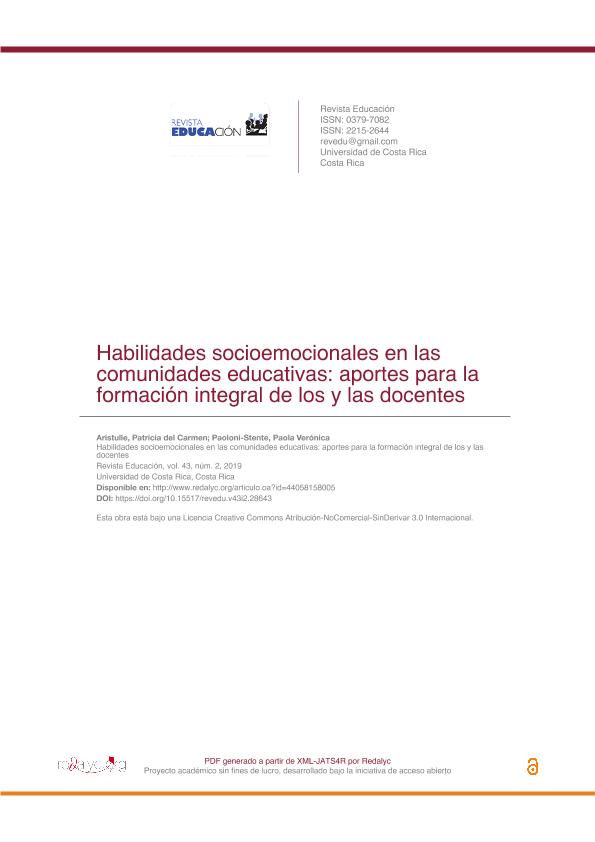Mostrar el registro sencillo del ítem
dc.contributor.author
Aristulle, Patricia
dc.contributor.author
Paoloni, Paola Veronica Rita

dc.date.available
2023-01-30T13:15:01Z
dc.date.issued
2019-09
dc.identifier.citation
Aristulle, Patricia; Paoloni, Paola Veronica Rita; Habilidades socioemocionales en las comunidades educativas: Aportes para la formación integral de los y las docentes; Universidad de Costa Rica. Facultad de Educación; Educación; 43; 2; 9-2019; 18–32
dc.identifier.issn
0379-7082
dc.identifier.uri
http://hdl.handle.net/11336/186069
dc.description.abstract
Este trabajo se orienta a describir y analizar el rol de las emociones y de las habilidades socioemocionales en el proceso de conformación de una comunidad educativa. La propuesta se implementó en los Profesorados de Educación Inicial y de Educación Primaria del Instituto Superior de Formación Docente San José (Córdoba, Argentina). La escuela constituye un ámbito favorable para el desarrollo de aprendizajes que exceden los contenidos curricularmente prescriptos. Entre estos contenidos, se destaca el desarrollo de habilidades socioemocionales, un tópico que impacta favorablemente en la conformación de una comunidad educativa. Nace la pregunta, entonces, cómo se prepara el futuro profesorado para considerar en sus prácticas estas perspectivas amplias del enseñar y del aprender, que superen ampliamente las habilidades cognitivas y coloquen entre otras prioridades las habilidades socioemocionales, importantes para su quehacer profesional. El trabajo que se presenta, pretende promover una reflexión sobre la complejidad de los procesos de aprendizaje y brindar aportes capaces de ampliar la perspectiva en la formación docente. En este marco, se indagaron las habilidades socioemocionales de estudiantes de profesorado a partir de la implementación de un cuestionario de autoinforme. Los resultados se estiman promisorios para abrir espacios de reflexión acerca del papel que debería desempeñar este tipo de habilidades en la nueva agenda didáctica. Así, los hallazgos obtenidos desafían a revisar los diseños curriculares que orientan la formación del cuerpo docente para identificar contribuciones capaces de impactar en el desarrollo de sus habilidades socioemocionales y propiciar la conformación de comunidades educativas.
dc.description.abstract
This study is aimed at describing and analyzing the role that emotions play on socioeconomic skills within an educational community as executed San Jose Primary School Teachers College in Cordoba, Argentina (Profesorados de Educación Inicial y de Educación Primaria del Instituto Superior de Formación Docente San José). This institute possesses a favorable learning environment that surpasses traditional prescriptive curriculums which include the development of socioemotional skills, a topic that has a positive impact on the composition of an educational community. We may ask ourselves, How are teachers preparing for the future in considering such teaching and learning perspectives within their scope of work? How will they broadly exceed the cognitive skills and place socioemotional skills as an important priority of their skillset? This study prompts us to reflect on the complexity of learning and aims to contribute to broadening the teaching horizons of teachers. Within this framework, the socioemotional skills of teachers in training was surveyed through a questionnaire. The results are considered promising in order to open spaces for reflection on the role that this type of skills should play in the new didactic agenda. Thus, the obtained findings challenge us to revise the curricular designs that guide teacher training to identify contributions capable of impacting their socio-emotional skills and promote the development of educational communities. The results are considered to be promising since they open spaces for reflection on the role that these types of skills could play in the new didactic agenda. Thus, the obtained findings challenge us to revise curricular designs that guide teacher training to identify contributions that will foster the development of their socio-emotional skills and promote the evolution of educational communities.
dc.format
application/pdf
dc.language.iso
spa
dc.publisher
Universidad de Costa Rica. Facultad de Educación
dc.rights
info:eu-repo/semantics/openAccess
dc.rights.uri
https://creativecommons.org/licenses/by-nc-nd/2.5/ar/
dc.subject
HABILIDADES SOCIOEMOCIONALES
dc.subject
COMUNIDAD DE APRENDIZAJE
dc.subject
PERSPECTIVA INTEGRAL
dc.subject
FORMACIÓN DOCENTE
dc.subject.classification
Educación General

dc.subject.classification
Ciencias de la Educación

dc.subject.classification
CIENCIAS SOCIALES

dc.title
Habilidades socioemocionales en las comunidades educativas: Aportes para la formación integral de los y las docentes
dc.title
Socio-emotional skills in educational communities: Contributions to integral teacher training
dc.type
info:eu-repo/semantics/article
dc.type
info:ar-repo/semantics/artículo
dc.type
info:eu-repo/semantics/publishedVersion
dc.date.updated
2023-01-30T11:16:43Z
dc.identifier.eissn
2215-2644
dc.journal.volume
43
dc.journal.number
2
dc.journal.pagination
18–32
dc.journal.pais
Costa Rica

dc.journal.ciudad
San José de Costa Rica
dc.description.fil
Fil: Aristulle, Patricia. Universidad Nacional de Río Cuarto; Argentina
dc.description.fil
Fil: Paoloni, Paola Veronica Rita. Universidad Nacional de Río Cuarto. Instituto de Investigaciones Sociales, Territoriales y Educativas - Consejo Nacional de Investigaciones Científicas y Técnicas. Centro Científico Tecnológico Conicet - Córdoba. Instituto de Investigaciones Sociales, Territoriales y Educativas; Argentina
dc.journal.title
Educación
dc.relation.alternativeid
info:eu-repo/semantics/altIdentifier/url/https://revistas.ucr.ac.cr/index.php/educacion/article/view/28643
dc.relation.alternativeid
info:eu-repo/semantics/altIdentifier/doi/https://doi.org/10.15517/revedu.v43i2.28643
dc.relation.alternativeid
info:eu-repo/semantics/altIdentifier/url/https://dialnet.unirioja.es/servlet/articulo?codigo=7107632
Archivos asociados
